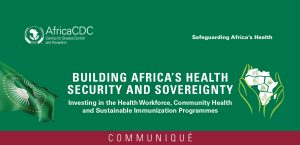Considering the general decline in funding for research and development, Africa CDC, in collaboration with the World Hepatitis Alliance (WHA) and the African Viral Hepatitis Action Group (AVHAG), has developed a capacity-buildingprogramme for hepatitis elimination and advocacy.
It was from one such gathering, held from 2 to 4 June 2025 in Gabon, that joint national action plans were developed. These plans are currently co-led by local civil society organisations and viral hepatitis programme managers from five African Union Member States.
Burundi, Cameroon, Gabon, São Tomé and Príncipe, and Chad benefited from this high-impact empowerment programme, which aims to strengthen the role of affected populations and community groups as key drivers of advocacy, policy influence, and community engagement in the elimination of viral hepatitis in Africa. It recognises civil society organisations as crucial allies in the fight against disease, particularly in the prevention and control of hepatitis B and C.
“I invite you to remain mobilised, to strengthen the synergies that we have initiated here, and to work together to maintain the momentum for change. Because it is together—with an equipped, organised and committed civil society—that we will achieve our continental objectives of eliminating viral hepatitis by 2030,” said Dr Brice Bicaba, Director, Central Africa RCC, opening the meeting.
These joint action plans between civil society organisations and the Ministries of Health are essential for moving from isolated efforts to a unified, strategic, and people-centred response to viral hepatitis. They help transform advocacy into concrete actions and ensure no one is left behind in the fight against the disease, putting communities at the centre of interventions.
In line with the Cairo Declaration on Viral Hepatitis in Africa, in which Heads of State and Government of the African Union (AU) urged governments and citizens to commit to scaling up prevention, testing and treatment services, Africa CDC launched a continental viral hepatitis prevention and control programme in 2022, supported by the Korea International Cooperation Agency (KOICA).
The aim of this programme is to help the 55 Member States of the African Union establish or strengthen their viral hepatitis control programmes in three main areas: continental coordination, workforce development and South–South collaboration, and the development of African guidelines for the management of hepatitis B.
“Viral hepatitis continues to pose a significant public health challenge in Africa, often overshadowed despite its profound impact on communities. By supporting Africa CDC’s efforts, KOICA reaffirms its commitment to strengthening public health systems through regional collaboration, evidence-based action, and long-term capacity building. Together, we are laying the groundwork for the elimination of hepatitis as a public health threat across the continent,” said Dr Sangwoo Tak, KOICA Senior Technical Advisor.
According to the latest report from the World Health Organization, Africa alone accounts for 63% of new hepatitis B virus infections. What’s more, fewer than 5% of people with the virus are screened, and less than 1% are receiving treatment. As for hepatitis C—although curable—only around 13% of people carrying the virus are screened, with just 3% receiving treatment. This alarming situation calls for a more ambitious, coordinated, and inclusive response.
This training marks an important first step in the roll-out of the programme to build the capacity of civil society organisations across the continent. Other regions of the African Union will also benefit from this initiative in the coming months.
Between July and December 2025, the finalised joint action plans will be approved by each Member State, with clear roadmaps including specific actions to be taken to achieve common goals and advocate for increased funding. Participants also agreed to set up a technical working group on viral hepatitis for ongoing exchange of experiences and best practices.
“Thanks to your contributions, we have not only strengthened the capacity of civil society organisations to better structure their advocacy and community engagement activities, but we have also laid the foundations for more coherent and inclusive collaboration between health authorities, civil society actors and partners,” said Dr Bicaba.







